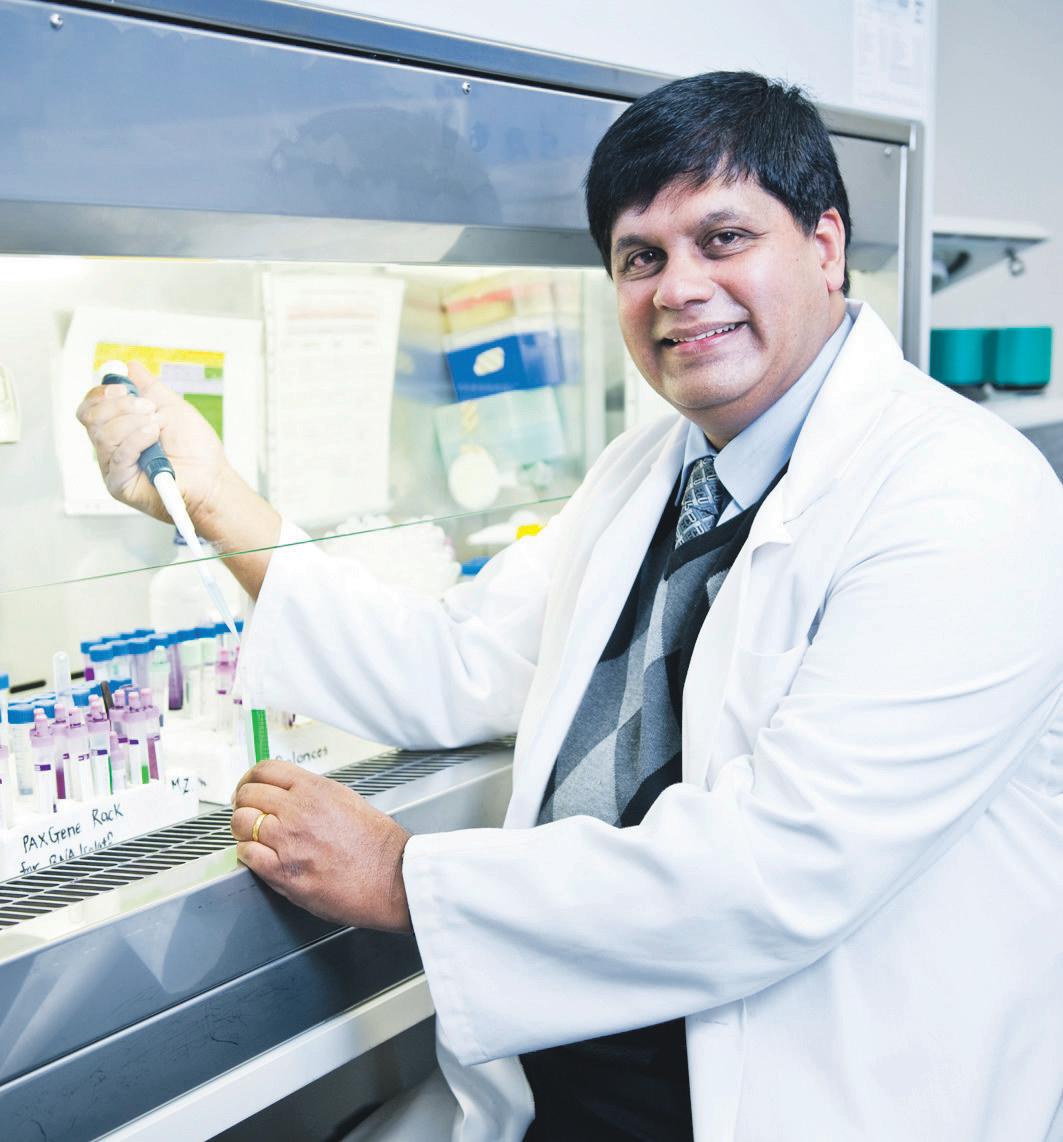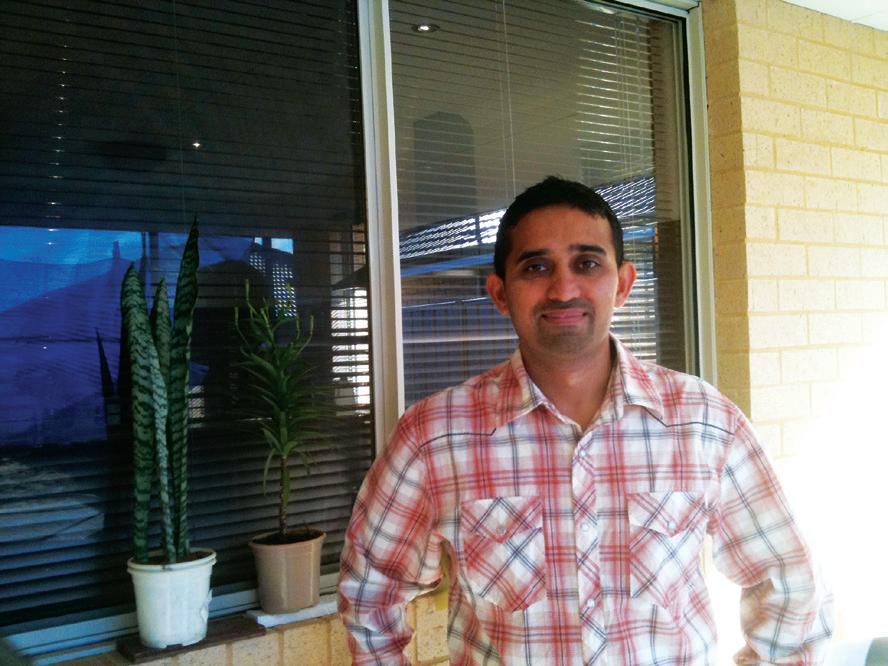
5 minute read
seeking A solution to AlzheiMer’s DiseAse
from 2013-02 Melbourne
by Indian Link
For distinguished service to medicine in the field of psychiatry through leadership in the research into Alzheimer’s disease.
of themselves to others in our community.”
Professor Ralph researcher of Indian origin was named in the Australia Day 2013 Honours List recently. He was appointed an Officer in the Order of Australia for his research into Alzheimer’s disease and the development of early diagnosis and treatment programs. Professor Martins is the Foundation Chair in Ageing and Alzheimer’s disease and Director of the Centre of Excellence for Alzheimer’s disease research and care at Perth. He is an internationally recognised expert in the field of Alzheimer’s research, and has published more than 200 research articles in peer-reviewed publications. He was named Citizen of the Year for Western Australia in 2011 and Western Australian of the Year in 2010.
Speaking from Perth, Dr Martins said, “I am deeply honoured at receiving this prestigious award and humbled that I have been lucky enough to be selected, because I know that there are many outstanding Australians who have given so much more more to give,” he said.
Over the past decade, Dr Rane has helped generations of women overcome physical and psychosocial issues associated with incontinence. He has recently copatented a mesh-based surgical kit (Perigee) to help sufferers.
“In the developing world, the burning issues we grapple with are birth and sexual trauma, fistulas and genital mutilation; while in the developed world we see prolapse, incontinence and now the scourge of females – genital cosmetic surgery,” he admitted.
After starting up the department of urogynaecology, he developed awareness-raising initiatives such as the ‘Beat the
Dr Martins believes that 2013 is going to be an exciting year for prevention trials. “My key future goals are to diagnose Alzheimer’s disease early, well before the symptoms are apparent and to develop and undertake effective prevention programs in collaboration with colleagues in Australia, India, Indonesia and the USA, with the aim to keep Alzheimer’s disease at bay”.
He also expressed gratitude to members of his team, the research foundation, the University and generous donors who enabled the research efforts to progress.
For more than 25 years, Dr Martins has been a dedicated researcher and world leader in Alzheimer’s research, and a part of medical teams who have made a number of internationally recognised discoveries which have contributed not only to the understanding of the disease, but also to its early detection. His other discoveries include genetic risk factors and lifestyle factors which contribute to the disease.
Through his leadership, commitment and tenacity, Dr Martins has built and continues to grow, a body of substantial and world-class research. He also continues to develop the clinical capacity of Western Australia with active links to his international
Bladder Blues’ program in a bid to educate thousands of women, particularly indigenous women in isolated communities.
Looking back at the challenges Dr Rane faced at the remote community hospital, he stated that the main hurdle was the metrocentric approach previously adopted.
“But in my opinion, all hurdles are a great opportunity to improve. Persistence, genuine passion, humility were the core building blocks of my team that totally changed the scenario. We soon learnt to leave behind our foreign egos and become one with the community,” he declared.
Despite extensive research and peers who are at the forefront of the battle against Alzheimer’s disease.
Dr Martins has collaborated with specialist colleagues in India at various levels, sharing breakthrough research and projects. One of these is the startup of collaborative Alzheimer research centres in India in some of the major metro cities.
“India is on the verge of an Alzheimer’s explosion of 100 million people affected by the disease in the near future, and there is not enough government funding or awareness of the problem,” he said.
Born in 1957 in Bahrain to parents who hailed from Goa in India, Dr Martins studied his ‘Senior Cambridge’ secondary qualifications at a boarding school in Quetta, in the Baluchistan region of Pakistan. Interestingly, to facilitate his frequent visits home, he was given a Pakistani passport (although he was never considered a Pakistani citizen). In June 1974, aged only 16, Dr Martins came to Perth, and the rest of his family followed three months later. On arriving, they immediately felt completely at home. Dr Martins appreciates the choice, freedom and opportunities that Australia has given him. He was interested in science and medicine, but when he couldn’t get into medicine, he enrolled in biochemistry at the teaching commitments within Australia, Dr Rane has also made it his mission to share his knowledge and expertise with developing nations where the sub-speciality is still in a relatively nascent phase. With this aim, he founded the UroGynaecology and Reconstructive Pelvic Surgical Society of India in 2005. Besides initiating a substantial research fellowship for overseas doctors to train in Australia, he has also established a fistula ward at the renowned Kasturba Gandhi (Gosha) Hospital in Chennai. Named after his wife Paula, whom he acknowledged as his pillar of strength, the ward lends support to distraught
Professor ralph martins, Ao
microbiologist wife Georgia, who now also works with the foundation. They married when he was 20.
Dr Martins went on to do research on the action of insulin on diabetics, but it was Georgia’s father’s very different disease that ultimately determined his direction.
“My father-in-law had Alzheimer’s, so I changed to neuroscience and started work with Colin Masters,” he said.
He believes the most important trait for success is self-belief; when he started off with research into Alzheimer’s, many in Melbourne – then the ‘Mecca’ of medical research – tried to dissuade him, but he was determined to go ahead. The success Dr Martins has achieved is a testimony to his determination, self-belief and perseverance. A recognised leader of research in Alzheimer’s disease, he continues to work to develop an early diagnostic blood test and feels that if the current rate of research is sustained, an early diagnostic test is just five to six years away.
With lifestyle a surprisingly large factor in the onset of Alzheimer’s disease, Ralph suggests women, both young and old. some basic warning signs GPs can pick up in their patients to get them onto a preventative course of action. Alzheimer’s risk factors include many of the usual suspects: lack of physical activity, obesity, high cholesterol, vascularassociated diseases (particularly type-2 diabetes), high blood pressure, and poor diet.
Dr Rane has also facilitated close bilateral cooperation between India and Australia, with local doctors travelling to India to research and address the issue.
Equally passionate about female infanticide and foeticide, Dr Rane has championed the tragic cause. In 2010, he co-produced Riwayat, a Bollywood film exploring the issues around female foeticide and infanticide.
“The movie was the result of the combined passion of Sanjay Patole and myself. We read that 40 million girls have been killed since 1984, and believed we needed to do something via the mass media.
He says, “What’s good for the heart is good for the brain”. He recommends physical activity of around 30 minutes a day which includes a mix of cardio and weight training. His research has shown fish, turmeric and green tea to be deterrents against Alzheimer’s and is collaborating with an Indian herbal product manufacturer to create an “antiAlzheimer’s” pill which can incorporate all of these ingredients in a form that’s easy for the body to absorb.
Dr Martins is also actively involved in St. Vincent de Paul as president of the Bentley branch, and spends several hours a week volunteering and visiting the needy. “It is more instantly rewarding, the joy of people being happy, just seeing their response, rather than doing research, which is a long road,” he claimed.
Our aim was to highlight the issue without apportioning blame. We got 14 international awards and met Omar Sharif, Richard Gere and Juliet Binoche. Sadly, we flopped in India. I think our message went too close to home. Nobody in the government is interested in adopting the movie. But we just want to save one life. If we did that was an effort well worth it,” he concluded.
As well, Dr Rane has managed to shake off the inertia and reticence towards urogynaecological disorders.
“Fifteen years and a liberal dose of humour later, people and the press are pouring into our forums,” he quipped.









